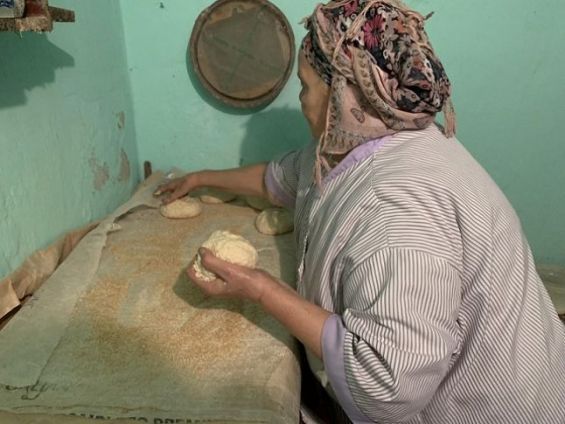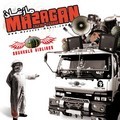Fatema El Khalif, elbow-deep in dough, turned and smiled into the pre-dawn light of the narrow Medina street. Sweat brightened her nose and creased forehead as the walls of her workshop glowed a warm aqua blue around her. She wore rose-pink slippers and a purple-striped robe.
Throughout the capital city, on Saturday mornings, men and women like El Khalif perspire in their shops as they knead mounds of dough, making the sounds and smells of daybreak. But El Khalif’s practice is unique. Unlike most bakers in Rabat, El Khalif prepares traditional Moroccan «house bread» using whole grains and barley instead of processed flour. And she does it all on her own.
A unique practice
«The other bread you find, you eat it all day and it will only make you fat. It has no nutrients,» said El Khalif, speaking through her grandson, Mohammed, who translated from Darija to French. She scooped a handful of grain out of the stock beneath her work table to show its texture and quality. The grain she uses is only minimally processed, which preserves more health benefits than breads containing processed flours and yeasts.
In a 2019 report, the Food and Agriculture Organization of the United Nations found an increase from 22.4% in 2012 to 25.6% in 2016 of the Moroccan adult population suffering from obesity. El Khalif suggested that processed foods — in particular staple foods like bread for Moroccans — are contributing to this trend.
But her bread is remarkable for more than just its health benefits. It breathes tradition.
«I make (the bread) like I would at home, like other people do at home,» said El Khalif.
She makes three varieties: barley-based, whole grain with salt, and whole grain without salt. Most vendors have abandoned this older method of bread-making in favor of a lighter, fluffier product. Yet El Khalif’s recipe — written nowhere — and methodology remain unchanged.
Born in the mountains outside the northern city of El Hoceima, El Khalif grew up with ten siblings who subsisted on a low and infrequent income. «We would only have a little bit to eat for many days, which we would share amongst ourselves,» she said. Without the money or the time, El Khalif was not able to pursue an education.
So she received a different education: household education. As a young woman, she learned from her mother and grandmother how to use each ingredient — water, salt, yeast and grain — for bread-making. She explained that bread-making was an expected task for women and therefore the know-how was naturally passed down, from mother to daughter, from that daughter to her daughter, and so forth.
An old tradition for an independent lifestyle
El Khalif ignited the gas oven with a tiny torch of discarded newspaper. She rinsed the leftover dough off her fingers and palms in a plastic basin bearing the remnants of a honey label.
In her early 20s, El Khalif left her husband in El Hoceima and travelled south to Rabat. Here she met her second husband, Mohammed Talbi Alami, a charismatic musician. He was the one who first opened the shop, where he used to gather with his bandmates to share music and tea.
Above her head, a photograph of him was tacked to the otherwise empty blue wall. She plucked off the tack to bring the film-glossed photograph into the light, before pressing it back into place.
«I can live independently. I can do it all myself,» El Khalif remarked on the lifestyle facilitated by her work. Using a short wooden board, she slid the raw loaves into the oven, one by one, like fitting together puzzle pieces.
She is the sole proprietor, baker, and resident character of the small shop. The storefront, more or less isolated on the residential Medina street, is open Monday through Thursday and weekends. Business is steady but «not every day,» she said through a warm smile, with no trace of bitterness despite the intensity of her daily labor.
The street lights had switched off long ago, but the air was still fresh, lunar and oceanic. A man’s voice reciting the Quran crackled through a radio on a corner-shelf as El Khalif finished laying out the fresh-baked loaves on a white cloth printed with red sketches of Rabat’s lighthouse.
El Khalif hovers somewhere in between the warm nest of her shop and the waking urban world. Between inside and outside, between the domestic and the professional.
Each morning, she bakes her bread, as daybreaks and the blue darkness of the Medina streets is slowly replaced by a profuse sunlight. A sunlight almost as warm as El Khalif’s bread when she ushers it out of the oven into a cloth-lined basket. A sunlight almost as bright as her smile. Fatema is currently sheltering-in-place with her family waiting for the day she would resume her activities as a baker.





 chargement...
chargement...













